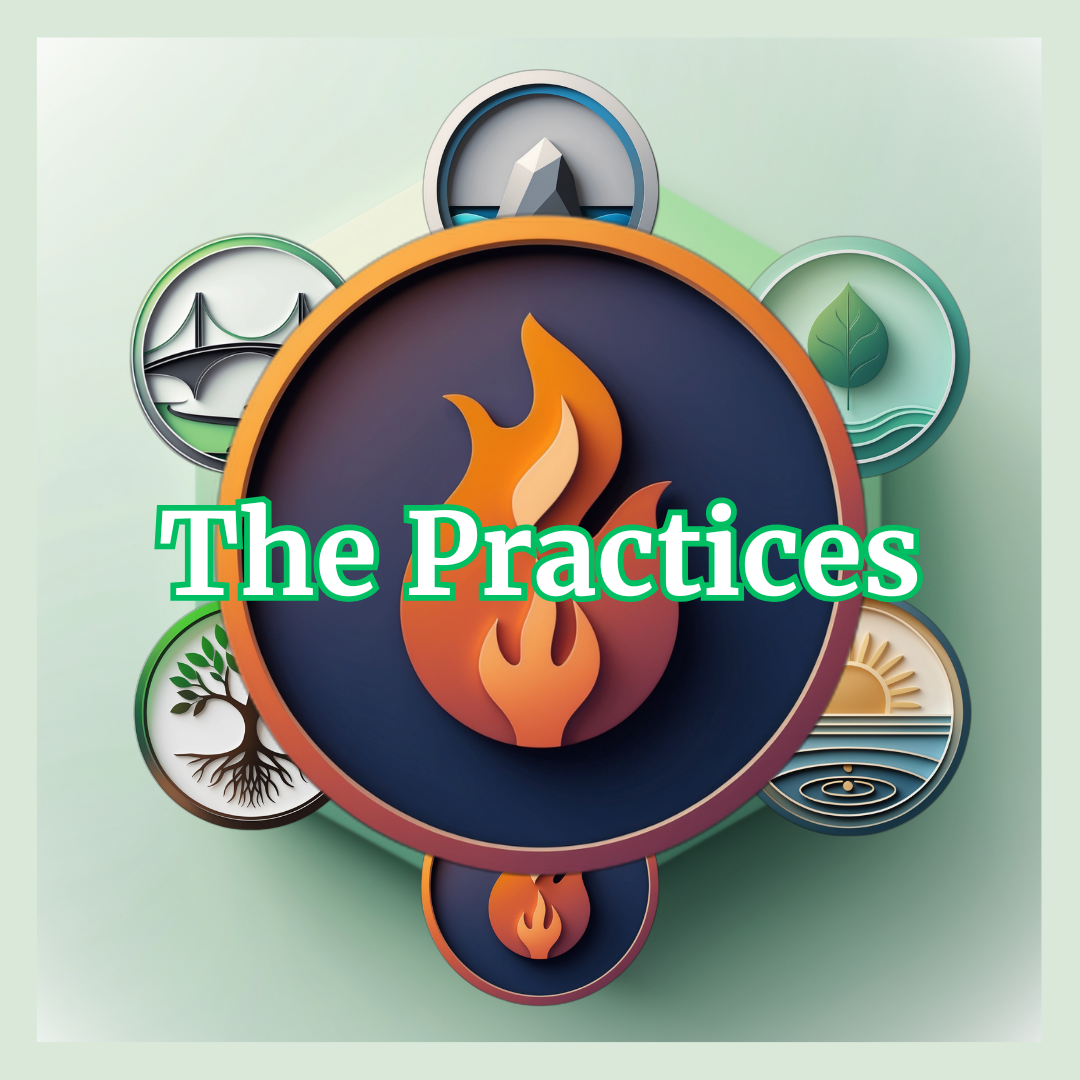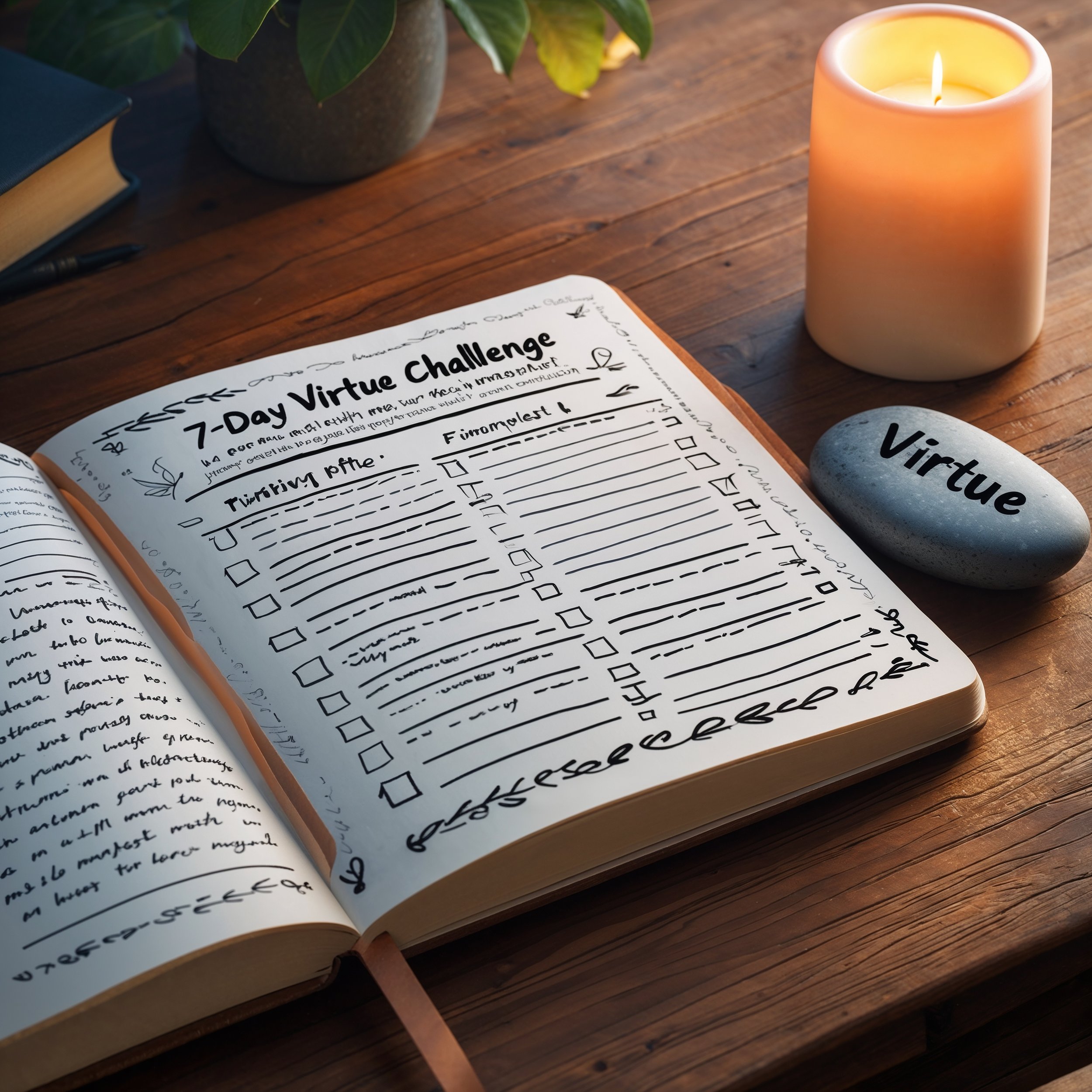Areteiwa – The Path of Virtuous Living: Cultivating Integrity in Every Action

We all aspire to live with integrity - to make choices that reflect our deepest values. Yet, in the face of pressure, self-doubt, or external expectations, it’s easy to drift away from our principles. How do we ensure that our daily actions align with virtue?
Areteiwa, the pillar of Focus on Virtue in Staoicism, offers a structured path to cultivate ethical clarity, self-discipline, and fairness in both personal and professional life. By integrating simple yet profound daily practices, we develop the resilience to stay true to our values, even in challenging situations.
This week, we explore three transformative practices designed to help you embody virtue with consistency and wisdom. These techniques will strengthen your decision-making, self-awareness, and relationships, empowering you to live with greater purpose.
Daily Practices for Virtuous Living

Value Check Pause
Every day, we make countless decisions - some small, others with long-term consequences. The Value Check Pause is a moment of reflection before acting, ensuring that your choices align with your highest virtues.
Steps to Practice
Ask Yourself: Does this decision reflect my values of courage, justice, or compassion?
Pause for Clarity: Consider how your choice impacts both yourself and others.
Act with Integrity: Commit to an action that upholds your ethical principles.
Example Scenario: Conducting Impactful and Growth-Focused Performance Reviews
Performance reviews are critical moments for employees - they can uplift, motivate, or, if handled poorly, discourage and disempower. Many managers rush through these reviews, treating them as a checklist rather than an opportunity for meaningful growth.

Without Areteiwa: A manager speeds through a performance review, providing vague or generic feedback. The employee leaves feeling unseen, without clear direction for improvement.
With Areteiwa – Practicing the Value Check Pause: Before the meeting, the manager takes a moment to reflect: “How can I make this review both fair and constructive?” Instead of generic comments, they offer balanced, actionable feedback, recognizing strengths while encouraging growth. The review becomes a powerful tool for development, rather than just a formality.
By pausing before key decisions, you create the space to act with clarity rather than impulse. Each moment of reflection strengthens your ability to make choices that uphold integrity, ensuring your actions align with your highest values..

Daily Virtue Reflection
Virtuous living is not about perfection - it’s about consistent self-reflection and growth. The Daily Virtue Reflection practice ensures that we actively engage with our values every day, reinforcing them through intentional practice.
Steps to Practice
Morning Intention: Choose one virtue (e.g., patience, honesty, courage) to embody throughout the day.
Evening Reflection: Write about how you upheld this virtue, any challenges faced, and what you learned.
Affirm Your Growth: Repeat the mantra: “I live with integrity, guided by virtue and peace.”
Example Scenario: Rebuilding Self-Confidence After a Personal Setback
Failure can shake our sense of self, making it easy to retreat into doubt and hesitation. When confidence wavers, the path forward isn’t in chasing external validation but in cultivating inner discipline and virtue. True confidence is rebuilt through intentional action, reflection, and a commitment to personal growth.

Without Areteiwa: After a major setback, you find yourself stuck in self-doubt. Instead of moving forward, you replay past failures, second-guess your decisions, and avoid stepping into new challenges. The fear of repeating mistakes keeps you from making progress.
With Areteiwa – Practicing Daily Virtue Reflection: Each morning, you set an intention to embody a guiding virtue—courage, perseverance, or patience. Throughout the day, you focus on acting in alignment with that virtue, no matter how small the step. In the evening, you reflect not on whether you succeeded or failed, but on how you showed up for yourself. Over time, the fear of failure fades, replaced by the steady confidence that comes from living in alignment with your values.
Confidence isn’t something you wait to regain - it’s something you actively rebuild. Through the daily practice of perseverance, discipline, and self-compassion, you strengthen the foundation of your self-worth, making it resilient to both setbacks and successes.

Acts of Relational Virtue
Our relationships thrive when they are built on fairness, gratitude, and ethical commitment. The Acts of Relational Virtue practice fosters stronger connections by ensuring our actions toward others reflect our highest principles.
Steps to Practice
Daily Action: Perform one act of fairness, empathy, or gratitude toward someone.
Reflect and Refine: Journal about how this action deepened a relationship or reinforced your values.
Celebrate Virtue: Recognize how living virtuously creates harmony in relationships.
Example Scenario: Supporting New Hires Through Hands-On, Role-Specific Training
Mentorship isn’t just a leadership responsibility - it’s something you can embody in any role. Whether you’re guiding a new colleague, sharing insights with a teammate, or helping someone navigate their first weeks on the job, the way you engage can shape their confidence and growth.

Without Areteiwa: You assume new hires will figure things out on their own. They have resources, instructions, and the same opportunities you had. But as days pass, you notice hesitation, uncertainty, and disengagement. Without clear support, they struggle to find their footing, leading to frustration for both them and the team.
With Areteiwa – Practicing Acts of Relational Virtue: You take the time to actively engage, offering small but intentional acts of guidance - answering questions with patience, explaining the reasoning behind key tasks, and ensuring they feel part of the team. By fostering an environment of support and fairness, you help new hires gain confidence, integrate faster, and contribute meaningfully. Through simple, everyday mentorship, you uphold the virtues of fairness, patience, and generosity, strengthening both relationships and the collective success of the team.
Mentorship isn’t about hierarchy - it’s about showing up for others with fairness, patience, and genuine support. Every small act of guidance creates a ripple effect, helping others grow while strengthening the integrity of the team as a whole.
Advanced Insights for Practicing Areteiwa
For those looking to deepen their commitment to virtue, consider these advanced techniques.

1. Moral Compass Check-in
At the end of each week, take a step back and ask yourself, “Did my actions reflect the virtues I strive to uphold?” This simple yet powerful habit keeps you accountable, ensuring that your daily choices align with your deeper values.

2. Virtue-Based Decision Grid
When faced with a difficult choice, break it down by evaluating how each option aligns - or conflicts - with your core virtues. By making virtue the guiding filter, you remove confusion and reinforce decision-making that stays true to your ethical foundation.

3. Silent Contemplation Practice
Set aside five minutes each day to sit in stillness, letting go of external distractions and allowing your deepest ethical insights to surface. In the quiet, clarity emerges, revealing where your actions align with virtue and where adjustments are needed.
Reframing Life Through Areteiwa
Areteiwa extends beyond structured practices - it influences how we approach life’s challenges. Here are three quick examples of how focusing on virtue can reshape daily situations.

1. Practicing Self-Forgiveness for Perceived Personal Failings
Without Areteiwa : You dwell on your mistakes, replaying them in your mind and letting self-judgment take over.
With Areteiwa : You acknowledge the mistake without self-condemnation, allowing space for learning, growth, and a renewed commitment to your values.

2. Setting Personal Boundaries While Working Remotely
Without Areteiwa : You struggle to disconnect, answering emails at all hours and letting work bleed into your personal time until exhaustion sets in.
With Areteiwa : You establish clear boundaries, honoring both your commitments and your well-being, creating a balance that sustains productivity without sacrificing yourself.

3. Delivering Difficult News with Empathy and Care
Without Areteiwa :You deliver difficult news without much consideration, focusing only on efficiency, leaving the other person feeling unsettled or dismissed.
With Areteiwa : You take the time to communicate with empathy and clarity, ensuring the message is honest yet considerate, balancing truth with respect and care.
Weekly Challenge: Living Your Virtues

Integrating Areteiwa into daily life doesn’t require sweeping changes - it begins with small, intentional actions that reinforce your commitment to virtue. This seven-day challenge will help you cultivate ethical awareness, self-discipline, and fairness in your interactions.
1. Morning Virtue Commitment: Each morning, take a quiet moment to choose one virtue to embody throughout the day - courage, patience, fairness, honesty, or any value that resonates with you. Say it aloud or write it down as a guiding principle.
As you move through your morning routine, look for small opportunities to put this virtue into practice. If you choose patience, notice how you react when something delays you. If you choose fairness, pay attention to how you distribute your time and energy among others. Setting this intention early will keep your virtue at the forefront of your mind.
2. Evening Reflection: At the end of the day, take a few minutes to reflect on how well you upheld your chosen virtue. Write down one moment where you stayed true to it and one moment where you struggled. Rather than judging yourself, use this as an opportunity for learning - what made it easy or difficult? What patterns do you notice in your behavior?
If you struggled, consider what might have helped you stay aligned with your virtue. If you succeeded, recognize what made it possible and how you can continue reinforcing that habit. Over time, this reflection deepens self-awareness and strengthens your ability to act with intention, even in challenging moments.
3. Acts of Relational Virtue: Beyond your personal reflections, commit to one daily act of fairness, empathy, or gratitude. This could be offering sincere encouragement, helping someone without being asked, or simply listening more attentively in a conversation.
As the week goes on, observe how these small gestures affect your relationships. Do they shift the way you connect with others? Do they make you more mindful of your interactions? By practicing virtue outwardly, you reinforce it within yourself.
Areteiwa and You: A Life Guided by Virtue

Virtuous living isn’t about rigid rules or impossible standards - it’s about the choices you make every day. It’s in the way you show up for yourself after a setback, the way you navigate difficult decisions, and the way you cultivate fairness and compassion in your relationships. Every action, no matter how small, is an opportunity to align with your values. Keep this mantra in mind:
“I live with integrity, guided by virtue and peace.”
As you step into this week, let virtue be your compass. Whether it’s pausing before a decision, reflecting on your growth, or practicing fairness in your interactions, each moment is a chance to refine who you are. The more you engage with this practice, the more naturally virtue becomes a way of being.
Which virtue will you focus on this week? How will you bring Areteiwa into your daily life? Share your thoughts in the comments - your insights may inspire someone else on their journey.
For more Stoic-Taoist wisdom, practical tools, and reflections, subscribe to our newsletter and continue the path toward mindful, intentional living.
Virtue isn’t an ideal you arrive at - it’s the way you move through the world. With each decision made in integrity, each moment met with wisdom, and each action rooted in fairness, you shape not just yourself but the world around you.
🌊 The Ripple Zone
🔗 Navigate the Flow: Visit the Staoic Compass to find all insights in one place.
🎥 Watch the related video : Breaking Free from Autopilot – Are Your Values at Risk? [ … ]
📩 Unlock Your Free Staoic Guide – Subscribe for Weekly Wisdom.
💬 Share your thoughts below: How are you finding harmony in your daily rhythm?
